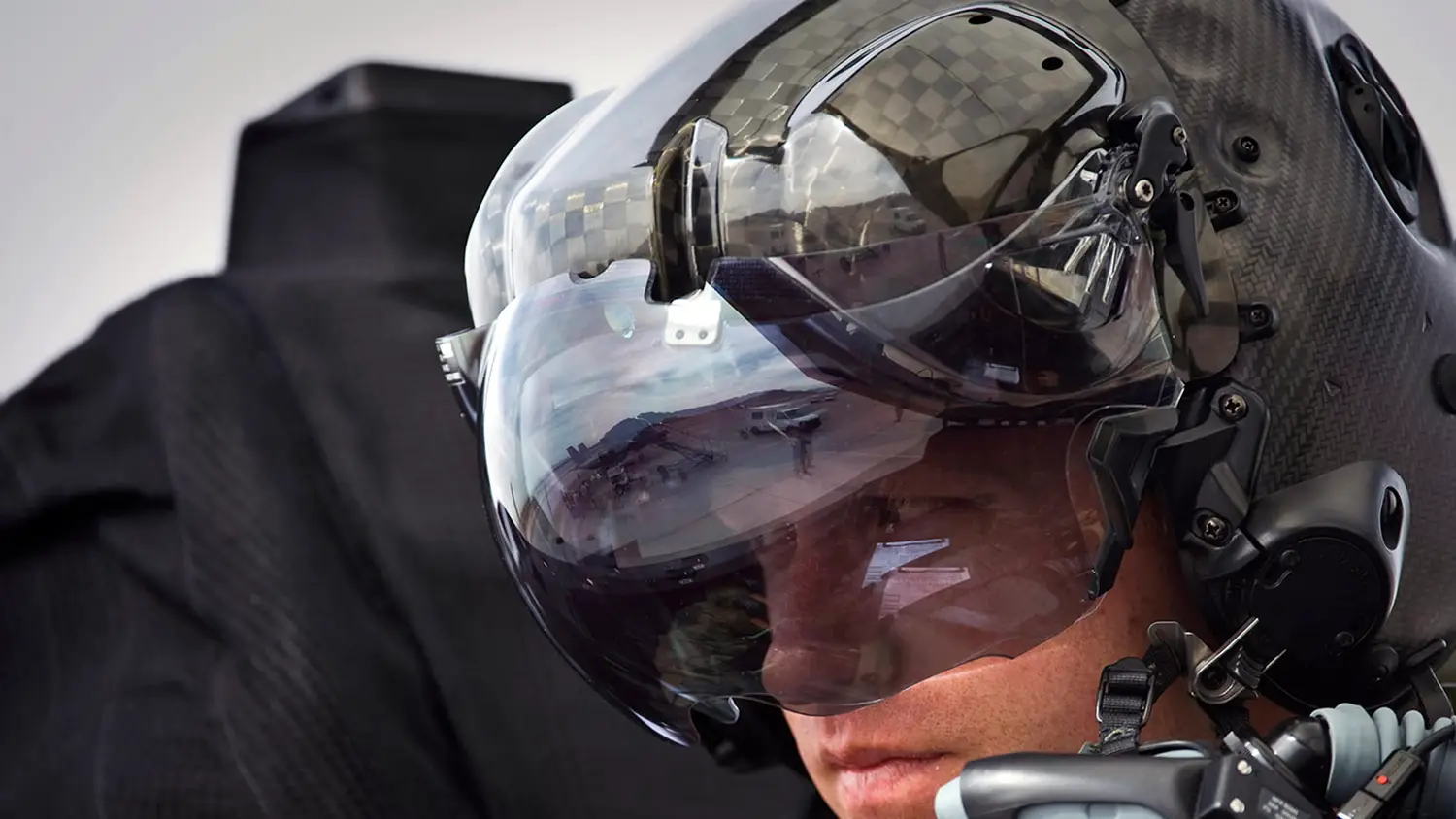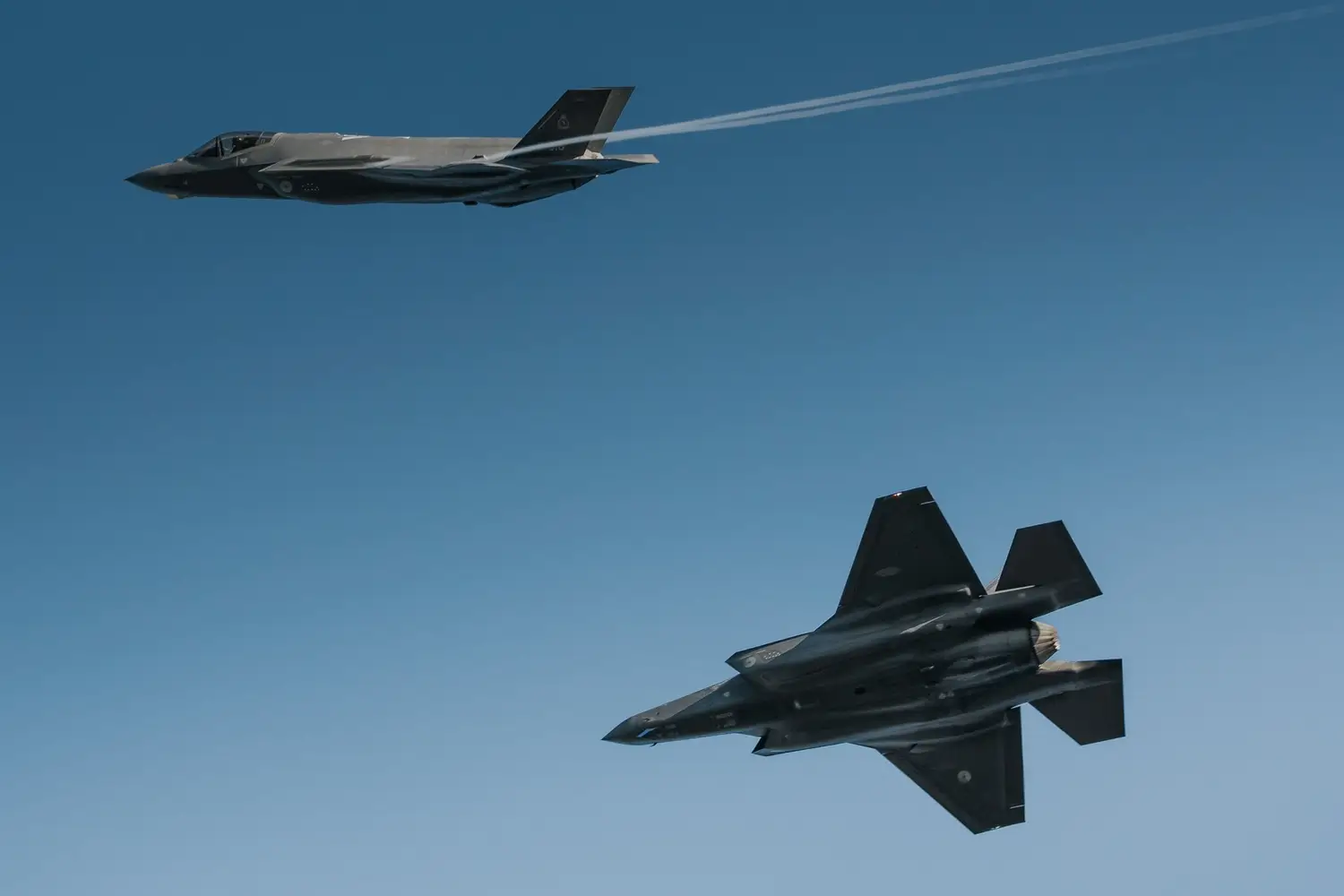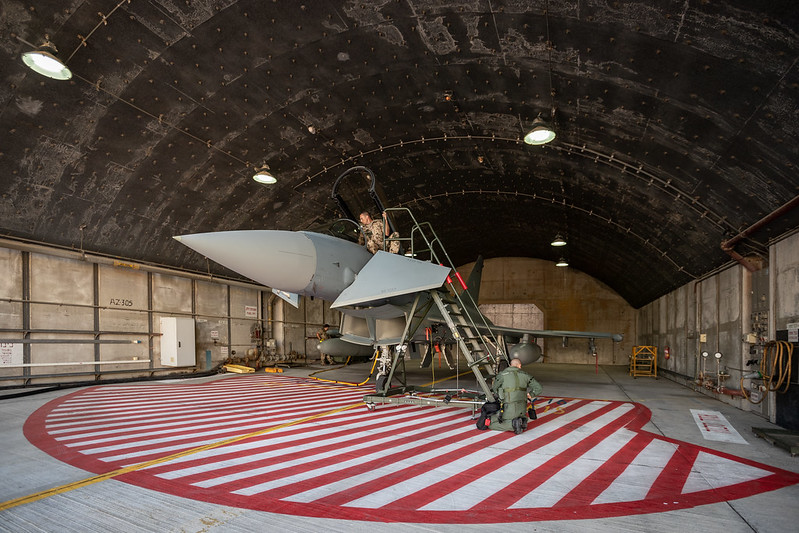READINESS REIMAGINED > SUSTAINMENT AND SUPPORT IN AN UNPREDICTABLE WORLD
studio | READINESS REIMAGINED | CHAPTER 5
A new hub-and-spoke logistics model is reshaping how Europe’s military maintains its hardware – with faster turnaround, greater local autonomy and reduced transatlantic delays.
Advanced systems like the F-35 pilot helmet rely on streamlined support to ensure operational readiness. (Photo: Collins Aerospace)
European nations are rapidly expanding their defence investments, placing new demands on military readiness, logistics and sustainment. As armed forces acquire new platforms and modernise existing fleets, there is growing recognition that effective support infrastructure must evolve in parallel.
An emerging answer to this challenge is the adoption of flexible, regionally anchored service models — designed to shorten repair cycles, increase autonomy and reduce the time and cost associated with long-distance sustainment.
One centre putting this model into practice is based in Heidelberg, Germany. Operated by Collins Aerospace, an RTX business, it is part of a wider hub-and-spoke network delivering tailored support across the continent – and beyond.
The Heidelberg centre services avionics and other equipment for a wide range of aircraft, from fighter jets like the Eurofighter Typhoon and Tornado to mainstay helicopters such as the CH-53 and Tiger, as well as a range of land vehicles. It also maintains an engineering and manufacturing hub for equipment, such as computers for the Eurofighter.
The centre has expanded over the years, with further development expected as Germany and other European nations bolster their Eurofighter fleets and look to future programmes.
Network power
Heidelberg is a key node in a wider network of centres, with five major hubs in the US and Germany connected to smaller, regional facilities. In Europe, this includes centres in Soesterberg in the Netherlands and Toulouse, France.
This wider network means that customers in the region can enjoy the benefits of domestic service where applicable, while also accessing the extensive services of a larger centre when required, without sending components and parts to the US.
There are multiple advantages to this approach, said Michael Nelson, director of the military service operation for Collins Aerospace avionics.
Perhaps most notably, it ensures the service work is performed in the timeliest possible fashion. The alternative – with the equipment being sent to a service centre in the US – would naturally require transportation across greater distances, with the associated impact on schedules.
Such service requirements would also be subjected to the Defense Priorities & Allocations System (DPAS), which prioritises such work depending on US needs. Additionally, local work is growing increasingly important in the wider political context, with the world facing trade challenges and stresses that have not been seen for decades.
‘I see multiple benefits from leveraging Heidelberg and expanding their capability,’ Nelson notes.
‘Not only from growing that organisation but also from being able to better serve the customers, specifically the military in those regions, and be more timely in getting them the units they need to keep them mission-capable.’
Perhaps most importantly, the German centre provides an unmatched degree of engineering expertise and experience.
‘I look at Germany as the known entity where we know the people, we know they do a , really good job. They’re good with the customer, they’re proven. They are the benchmark that will springboard opportunities across the globe.’
Two RNLAF F-35s in flight. Regional sustainment centres, such as those linked to Heidelberg, aim to keep fifth-generation fleets mission-ready with rapid repair and support services. (Photo: RNLAF)
European evolution
The wider geopolitical context – Russia’s full-scale invasion of Ukraine in 2022 – has prompted European nations to boost investment in their militaries to the highest levels since the Cold War.
There were already plans in place to purchase such platforms as F-35s or CH-47s before 2022, said Holger Eckstein, program manager for military services at the Heidelberg centre.
However, the transformed security situation has rapidly expedited military plans; for instance, Germany announced the purchase of 20 additional Typhoons in 2024 – on top of 38 already on order – ‘as a pure result of what we see in Ukraine’, Eckstein said.
There is likely to be more to come, with the country planning to boost its spending on defence and infrastructure by €500 billion in the coming years. All of this means Heidelberg will need to expand to meet that demand, along with the growing needs of other countries across Europe.
Such enhanced investment will illuminate the benefits of the hub-and-spoke approach, which is already proving its worth.
The concept is being pursued for the Netherlands’ F-35 aircraft, with the Dutch service centre operating as a spoke from the German site, providing the customer with speedy and effective local service where possible along with the benefits of a larger service centre on its doorstep.
Moreover, this is not the only example. Michael Mayer, head of service operations at Heidelberg, pointed to the company’s successful support to its customer in Saudi Arabia, which began with the Tornado and has expanded to the Eurofighter Typhoon.
‘From Heidelberg, we support their repair capability – we maintain the certification of quality employees and technical staff that Saudi Arabia is providing for our products,’ Mayer said.
‘We also offer a question and answering service around all technical issues they have. It’s a great collaboration in the Middle East from a European country.’
Local advantage
Mayer also highlighted the centre’s work on Multifunctional Information Distribution Systems (MIDS) terminals, which previously saw repairs being conducted out of the US, including European customers.
‘With a location in Europe, the repair process takes less time, getting the product back to the customer faster while increasing part availability,’ he said.
There are unique European benefits to the hub-and-spoke approach, noted Eckstein.
With more than 40 nations on the continent, many lack the fleet size to support dedicated in-country service centres. Instead, regional facilities such as Heidelberg offer a shared capability that enables access to reliable support without the need for national investment.
‘They can leverage it in the region, using Heidelberg as their repair facility,’ he said.There are also potential benefits for the US military, which maintains a major military presence in Europe, particularly in Germany.
Nelson said that in many cases, the US will wish to use its own depots, while working with Collins Aerospace hubs for the more complex repairs. As Heidelberg expands into the future, such work could increasingly be conducted in Germany – a short distance from Ramstein Air Base – rather than being sent to such US hubs.
Engineers from Germany's Tactical Air Wing 31 "Boelcke" prepare a Eurofighter for takeoff during the Blue Flag 2021 exercise at Ovda Air Base, Israel, in 2021 (Photo: Bundeswehr)
Engineering excellence
Heidelberg is a key part of a service centre network that is at the cutting edge of technology and engineering methodology. It has embraced the benefits of performance-based logistics (PBL), customisable programmes that guarantee a specified outcome, providing guaranteed parts availability depending on the particular need.
This essentially removes any concerns over availability from the customer. With a hub-and-spoke approach, military operators around Europe and beyond stand to benefit.
‘Ultimately, our vision is to better serve customers both domestically and internationally. If we can collaborate effectively and show the long-term benefits, it will be a win for everyone,’ Nelson concluded.
‘Given the age of much of the equipment and test systems, shared investment is important for everyone – industry, the customer and for the warfighter.’


